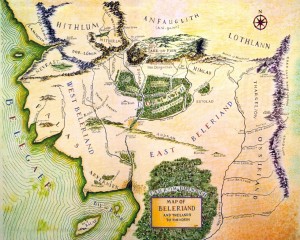Adventure
97
Strangely, the adventuresque quality of The Silmarillion is due mostly to the fact that at least 80 percent of its appeal is in how dry and boring it pretends to be. Its desire is to be both adventurous and dull. This is not an easy feat to pull off, mind you. Nor do I contend that it is actually dry and boring, but either intentionally or unconsciously, either for good or ill, it tries its very best to copy the history books that you read in high school. It could just be that the guy who wrote it was dull (a strong possibility) but my guess is that it is intentional.
The reason for this is no great mystery. It was most likely approached from this angle to give it what the people of France call “realism.” The fact that The Silmarillion takes itself so seriously gives it that certain je ne sais quoi.
The people of France, hitherto known as The French, have themselves another word: Milieu. Which is from the root word “mill” as in “to mill about”, which is yet another way of saying “to loiter”, and “ieu” which consists completely of vowels, but that is neither here nor there. Since folk must by necessity have a place or time to mill about in over time, the word evolved into its present day meaning: Physical or social surroundings. And while The Silmarillion is told in a somewhat linear fashion, it is more rooted in making us believe the place exists, not necessarily that the characters really said or didn’t say, or do the things it has them do.
The story itself is truly epic on a massive scale and attempts nothing less than to sum up an entire (made up) world in one book. One tiny book that is about the same size as The Hobbit, but spans millennia instead of the mere measly months that encompass all of The Hobbit. It claims to be written by one J.R.R. Tolkein (which totally should be the name of a steam train somewhere). But it was actually written/collected by Christopher Tolkein, his son, who was not as well known for world building as his father, but presumably has cultivated a deep talent for sorting through his dad’s weird old stories. I happen to have a dad that tells weird old stories and I can tell you: This is no small accomplishment.
The story starts with the song of Illuvatar who introduces a theme and then allows the Ea to play with the theme and provide the variations. As they sing, their song creates the world (or something). A dude named Melkor introduces discord into the tune and the stories get better from there. The real success of the Silmarillion is the absolute level of detail that you can see went into these stories. The fact that they are just the random collected back story for The Hobbit and The Lord of the Rings trilogy is startling. Even more curious is the claim that these stories and legends were written first.
Unlike so many prequels these days, that claim has the air of legitimacy. It becomes even more believable when you realize that the characters and events that are present in the hobbit and LOTR (pronounced “loiter”, as in “to mill about”) are barely even blips on the radar here. Sauron here is merely just a toady of Melkor and is not really all that bad in comparison. Again though, the great adventure here is in how vast and wide the story is. Though it lacks a main protagonist, The Silmarillion is intensely readable and addictive and more than deserves its place on our countdown.
Next up #96!



